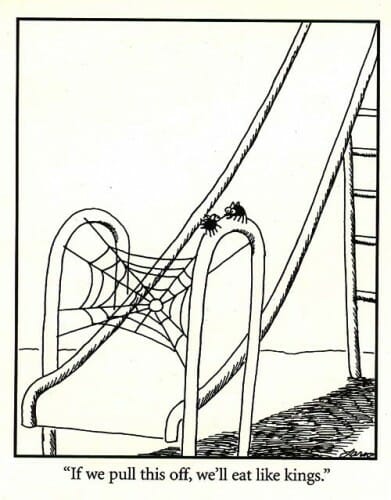Paul Krugman writes in the NY Times:
And as I watched the deniers make their arguments, I couldn't help thinking that I was watching a form of treason "” treason against the planet.
To fully appreciate the irresponsibility and immorality of climate-change denial, you need to know about the grim turn taken by the latest climate research"¦.
Well, sometimes even the most authoritative analyses get things wrong. And if dissenting opinion-makers and politicians based their dissent on hard work and hard thinking "” if they had carefully studied the issue, consulted with experts and concluded that the overwhelming scientific consensus was misguided "” they could at least claim to be acting responsibly.
But if you watched the debate on Friday, you didn't see people who've thought hard about a crucial issue, and are trying to do the right thing. What you saw, instead, were people who show no sign of being interested in the truth. They don't like the political and policy implications of climate change, so they've decided not to believe in it "” and they'll grab any argument, no matter how disreputable, that feeds their denial"¦.
Still, is it fair to call climate denial a form of treason? Isn't it politics as usual?
Yes, it is "” and that's why it's unforgivable.
Do you remember the days when Bush administration officials claimed that terrorism posed an "existential threat" to America, a threat in whose face normal rules no longer applied? That was hyperbole "” but the existential threat from climate change is all too real.
Yet the deniers are choosing, willfully, to ignore that threat, placing future generations of Americans in grave danger, simply because it's in their political interest to pretend that there's nothing to worry about. If that's not betrayal, I don't know what is.
So is it fair to call it willful blindness when Krugman ignores principled arguments against catastrophic anthropogenic global warming theory in favor of painting all skeptics as unthinking robots driven by political goals? Yes it is.
I am not entirely sure how Krugman manages to get into the head of all 212 "no" voters, as well as all the rest of us skeptics he tars with the same brush, to know so much about our motivations. He gives one example of excessive rhetoric on the floor of Congress by a skeptic "” and certainly we would never catch a global warming alarmist using excessive rhetoric, would we?
Mr. Krugman, that paragon of thinking all of us stupid brutes should look up to, buys in to a warming forecast as high as 9 degrees (Celsius I think, but the scientist Mr. Krugman cannot be bothered to actually specify units). In other words, he believes there will be about 1 degree per decade warming, where we saw exactly zero over the last decade. Even in the panicky warming times of the eighties and nineties we never saw more than about 0.2C per decade. Mr. Krugman by implication believes the the Earth's climate is driven by strong positive feedback (a must to accept such a high forecast) "” quite an odd assumption to make about a long-term stable stystem without any good study showing such feedback and many showing the opposite.
But, more interestingly, Mr. Krugman also used to be a very good, Nobel-prize winning economist before he entered his current career as political hack. (By the way, this makes for extreme irony - Mr. Krugman is accusing others of ignoring science in favor of political motivations. But he is enormously guilty of doing the same in his own scientific field). It is odd that Mr. Krugman would write
But in addition to rejecting climate science, the opponents of the climate bill made a point of misrepresenting the results of studies of the bill's economic impact, which all suggest that the cost will be relatively low.
Taking this statement at face value, a good economist would know that if the costs of a cap-and-trade system are low, then the benefits will be low as well. Cap-and-trade systems or more direct carbon taxes only work if they are economically painful for energy consumers. It is this pain that changes behaviors and reduces emissions. A pain-free emissions reduction plan is also a useless one. And in fact, the same studies that show the bill would have little economic impact also show it will have little emissions impact. And thus it is particularly amazing Krugman can play the "traitor" card on 212 people who voted against a bill nearly everyone on the planet (including the ones who voted for the bill) know will not be effective.
I remember the good old days when Democrats thought it was bad when Republicans called folks who did not agree with them on Iraq "traitors." After agreeing with Democrats at the time, I am disapointed that they have adopted the same tactic now that they are in power.
